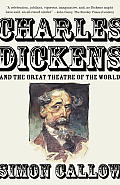 I had what I suppose was an average level of knowledge of Dickens. He wasn’t in great favor in University English departments of my time. Too much a favorite of the masses, I suppose. I read a few of the biggie’s but didn’t really study The Tale of Two Cities, Great Expectations, and the like. I knew most of his works were serialized, that he wrote under pressure, and that he was paid by the word, often resulting in bloated products. I knew that he was famous for his readings. I knew his father was a debtor and that the family’s economic problems during his boyhood, greatly influenced his writing and his politics. Didn’t think I needed to know a great deal more, but the subtitle of this one intrigued me–The Great Theatre of the World. So I picked it up. Good choice.
I had what I suppose was an average level of knowledge of Dickens. He wasn’t in great favor in University English departments of my time. Too much a favorite of the masses, I suppose. I read a few of the biggie’s but didn’t really study The Tale of Two Cities, Great Expectations, and the like. I knew most of his works were serialized, that he wrote under pressure, and that he was paid by the word, often resulting in bloated products. I knew that he was famous for his readings. I knew his father was a debtor and that the family’s economic problems during his boyhood, greatly influenced his writing and his politics. Didn’t think I needed to know a great deal more, but the subtitle of this one intrigued me–The Great Theatre of the World. So I picked it up. Good choice.
It turns out my original impressions were more or less accurate–the parts about writing under pressure and being paid by the word, for example. What I didn’t know was that, though he began writing for other publishers, he began to establish periodicals and publish his own works in them. The biggest surprise, though, was his lifelong involvement in the stage at all levels. Unfortunately, none of his playwriting efforts has achieved the status of his novels (The Christmas Carol started as a story), which is probably the reason for the general ignorance on this subject. However, he in fact haunted theaters from his days as a lad, remained close friends with any number of actors, and toured in theatrical productions as actor/producer/costumer/scene-builder throughout his life. He became famous for his twelfth night extravaganzas, which over the years included more and more material from his own works–Pickwick, Carol, etc. He would take apart home and hearth or schools to create performing spaces,a then put the buildings back together afterwards.
A look back at his novels with all this in mind proves the strong presence of a theatrical imagination, and it seems that he acted out scenes and characters as he wrote. Little wonder that as movies and television developed, Dickens’ works became prime material, almost an industry in itself.
Finally, of course, one is tempted to think that all this  was preparation for the extraordinary series of reading tours that consumed so much of his time and energy throughout the last years of his life. He over and over regaled audiences as large as a couple of thousand people with no microphone, just his presence and his voice to fill the place.
was preparation for the extraordinary series of reading tours that consumed so much of his time and energy throughout the last years of his life. He over and over regaled audiences as large as a couple of thousand people with no microphone, just his presence and his voice to fill the place.
His works have gotten new respect lately, as we begin to realize that popularity and mediocrity don’t necessarily go hand in hand. It’s good to see that artistry recognized. And, with Callow’s book about a man blessed not only with creativity galore, but with more energy than any three or four of us combined (How many could publish a magazine, write a novel, write and perform plays, and trudge all over Europe on a continuous basis for decades?), we become acquainted with someone who deserves recognition as not only a literary but a theatrical phenomenon as well. I thank Callow, quite an actor in his own right, for giving us this perspective on Dickens.
